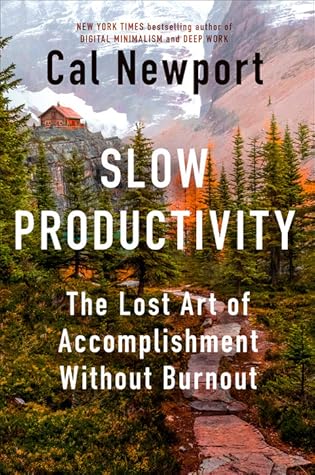More on this book
Community
Kindle Notes & Highlights
by
Cal Newport
Read between
March 17 - March 28, 2024
The goal in betting on yourself, as you’ll see, is to push yourself to a new level without accidentally also pushing yourself into an unnaturally busy workload.
These authors demonstrate one of the more approachable strategies for betting on yourself: temporarily dedicating significant amounts of free time to the project in question. The stakes here are modest: If you fail to reach the quality level that you seek, the main consequence is that during a limited period you’ve lost time you could have dedicated to more rewarding (or restful) activities. But this cost is sufficiently annoying to motivate increased attention toward your efforts.
This spare time strategy, of course, is not a sustainable way to work in the long term. Sacrificing too many of your leisure hours to extra work can violate both of the first two principles of slow productivity. But when deployed in moderation, dedicated to a specific project for a temporary period, this act of giving up something meaningful in pursuit of higher quality can become an effective bet on yourself.
Committing your free time to a project is one of the easier ways to bet on yourself. A more drastic option is to rely on the project for income. Few forces induce more focus than the need to pay bills. It’s here, however, that we wander into some potentially dangerous territory.
It’s in these details that we find a balanced strategy. Don’t haphazardly quit your job to pursue a more meaningful project. Wait instead to make a major change until you have concrete evidence that your new interest satisfies the following two properties: first, people are willing to give you money for it, and second, you can replicate the result.
It might instead mean that you reduce your hours, or take an unpaid leave. The key is to harness the stark motivation generated by the need for a pursuit to really work out.
If you announce your work in advance to people you know, you’ll have created expectations. If you fail to produce something notable, you’ll pay a social cost in terms of embarrassment. Not surprisingly, this, too, can act as a powerful motivator.
There are few things we value more than the esteem of our fellow humans. Announcing a schedule for your work hijacks this quirk of our species’ evolution to sharpen our focus on producing the best work possible.
Assault on Precinct 13 is a cool film, but Halloween is great. The difference was the scale of investment supporting Carpenter. The easy explanation for this observation is that more money enables better production quality. This is partially true. Carpenter, along with his then unknown director of photography, Dean Cundey, spent nearly half of Akkad’s $300,000 on brand-new, lightweight Panavision cameras—a new technology at the time that allowed them to film in long, gliding Steadicam shots while maintaining a cinematic aspect ratio.
Attracting other people to invest in you and your idea is a dramatic bet on yourself and your ability to not let others down. In the drive to avoid this disappointment, greatness can be found.
Slow productivity is just one response among many to a much bigger problem: The world of cognitive work lacks coherent ideas about how our efforts should be organized and measured.
What’s needed is more intentional thinking about what we mean by “productivity” in the knowledge sector—seeking ideas that start from the premise that these efforts must be sustainable and engaging for the actual humans doing the work. Slow productivity is one example of this thinking, but it shouldn’t be the only one.
And if somebody says to me, “You’re a prolific writer”—it seems so odd. It’s like the difference between geological time and human time. On a certain scale, it does look like I do a lot. But that’s my day, all day long, sitting there wondering when I’m going to be able to get started. And the routine of doing this six days a week puts a little drop in a bucket each day, and that’s the key. Because if you put a drop in a bucket every day, after three hundred and sixty-five days, the bucket’s going to have some water in it.
If you collect modest drops of meaningful effort for 365 days, McPhee reminds us, you’ll end the year with a bucket that’s pretty damn full. This is what ultimately matters: where you end up, not the speed at which you get there, or the number of people you impress with your jittery busyness along the way.
We’ve tried the fast approach for at least the past seventy years. It isn’t working. The time has come to try something slower.


